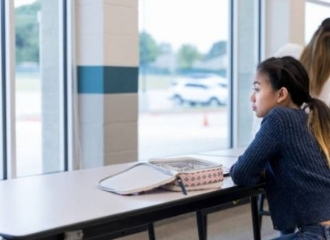Written by: Lauren Pendleton, MA, LCMHC
Senior Professional Relations Representative, The Renfrew Center

Preparation for each school year can be an anxiety-provoking event, not only for the student, but also for the family. Each year brings change, sometimes an abundance of it, and with it can come the feeling of lost control.
Here are 5 ways families can help.
1. Identify a Support System and a Treatment Team
Formulating a solid plan can help combat stress, encouraging a continued and steady recovery. It is important that this plan has a strong foundation, focused mainly on communication between you and your loved one.
Identifying a treatment team for your student is one of the first steps, which may include school counselors, teachers, nurses, coaches, and administration. These individuals will likely be the ones who are providing support to your student, both during mealtimes and throughout the day, and will also be trusted with monitoring for engagement in eating disorder behaviors.
In addition to building a strong team within the school community, maintaining a relationship with your student’s outpatient supports will also help create a sense of security as they make the transition back to school. A strong outpatient team usually includes a therapist, dietitian, primary care physician, and a psychiatrist, if needed, for medication management.
Remember, the school staff is there to support the work being done with your student and their outpatient team, not replace them. Be sure to discuss an appointment schedule that will not be disrupted by school activities.
2. Practice Flexibility
Many of us know the old saying, the best laid plans often go awry. When this happens, focus on how you react to the event. While setting a plan of action is important, it is also imperative that throughout the recovery process, all individuals involved see the plan as an adaptable guideline.
Students may have to confront a multitude of last-minute changes to their treatment plan, such as the school menu modifications, eating with a new set of peers or a support individual being out for a sick day. For someone in recovery, these instances may cause a great deal of emotion.
The key is for the individual to acknowledge their anxiety, implement their skills to cope with the emotion and then explore options for the newly presented situation. Discussing potentially difficult situations, as well as alternative plans of action prior to the school year starting, may help your student feel more secure in their ability to face these situations as they arise.
3. Use Your Voice
Advocacy is a skill that can help students feel more confident as they transition back to the school environment.
This could be especially important when it comes to mealtimes, certain classes, such as health/PE, or even during sports practices. Remind your student that asking for what they need to best support their recovery in these situations is not a sign of weakness, but rather one of strength. You can help your child find their own voice by modeling open, authentic communication and reminding them that all emotions are valid and useful.
Check in with your child and encourage them to clearly verbalize how they are feeling and what they are needing. Praise them and tell them you’re proud of them whenever they seek out support on their own or are honest with you about their struggles.
4. Prioritize Recovery
Juggling the demands of school and recovery can be challenging, especially if your student struggles with perfectionistic tendencies.
The pressure to perform well in the classroom as well as in extracurricular activities can easily distract from the therapeutic work that is required to fully heal. Give your student permission to put their recovery and their mental health first, even if that means taking a medical leave from school to focus on treatment or admit to a higher level of care.
Making these tough decisions can be difficult for students who believe there is a specific timeline they must follow to be successful. Many students compare accomplishments with peers and might feel that treatment will put them “behind” in life.
Help your student reframe these beliefs by reminding them that prioritizing their mental and physical health lays the foundation for their academic goals and career aspirations. Remind them that everyone’s journey is different. Focusing on recovery now can save them years of struggle in the future and make their academic lives so much more enjoyable.
5. Model Self-Care and Healthy Coping
School can bring on many new stressors and your student might be tempted to turn to eating disorder behaviors to numb or cope. By prioritizing your own self-care, modeling healthy coping strategies and normalizing both rest and play, your child will be more likely to internalize these values for themselves.
If you or your family members struggle with managing stress or tolerating intense emotions, consider seeking out individual, family or group therapy and/or joining a support group. Your student has the best chance of successfully coping with school stressors and eating disorder triggers if their family members are also coping well with their own demands of everyday life.
Reduce or eliminate any debates or disagreements in the house about food, weight or any other aspects of the treatment plan by bringing any intense topics to a joint therapy session or to a family therapy session. A professional can help you and your family members communicate in the healthiest way possible.
Conclusion

If at any point your student’s struggles increase and recovery becomes less maintainable, a higher level of care may be necessary. For those who wish to stay in school while receiving treatment, options such as IOP, Outpatient and Virtual programming are all great options. If a medical leave is necessary, Day Treatment and Residential care provide the most supportive environments for your child to heal. The Renfrew Center is here as a resource for you and your student – to learn more about available programs and services, please reach out to us here.







